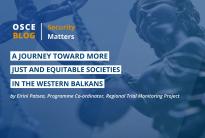Navigation
- Home
- Who we are
- What we do
- Arms control
- Border management
- Combating trafficking in human beings
- Countering terrorism
- Conflict prevention and resolution
- Cyber/ICT Security
- Democratization
- Economic activities
- Education
- Elections
- Environmental activities
- Gender equality
- Good governance
- Human rights
- Media freedom and development
- Migration
- National minority issues
- Policing
- Reform and co-operation in the security sector
- Roma and Sinti
- Rule of law
- Tolerance and non-discrimination
- Youth
- #GLOBALGOALS - The OSCE and the Sustainable Development Goals
- Where we are
- Presence in Albania
- Mission to Bosnia and Herzegovina
- Mission in Kosovo
- Mission to Montenegro
- Mission to Serbia
- Mission to Skopje
- Mission to Moldova
- Centre in Ashgabat
- Programme Office in Astana
- Programme Office in Bishkek
- Programme Office in Dushanbe
- Project Co-ordinator in Uzbekistan
- Closed field activities
- Institutions & structures
- Resources
Navigation
- Home
- Who we are
- What we do
- Arms control
- Border management
- Combating trafficking in human beings
- Countering terrorism
- Conflict prevention and resolution
- Cyber/ICT Security
- Democratization
- Economic activities
- Education
- Elections
- Environmental activities
- Gender equality
- Good governance
- Human rights
- Media freedom and development
- Migration
- National minority issues
- Policing
- Reform and co-operation in the security sector
- Roma and Sinti
- Rule of law
- Tolerance and non-discrimination
- Youth
- #GLOBALGOALS - The OSCE and the Sustainable Development Goals
- Where we are
- Presence in Albania
- Mission to Bosnia and Herzegovina
- Mission in Kosovo
- Mission to Montenegro
- Mission to Serbia
- Mission to Skopje
- Mission to Moldova
- Centre in Ashgabat
- Programme Office in Astana
- Programme Office in Bishkek
- Programme Office in Dushanbe
- Project Co-ordinator in Uzbekistan
- Closed field activities
- Institutions & structures
- Resources










